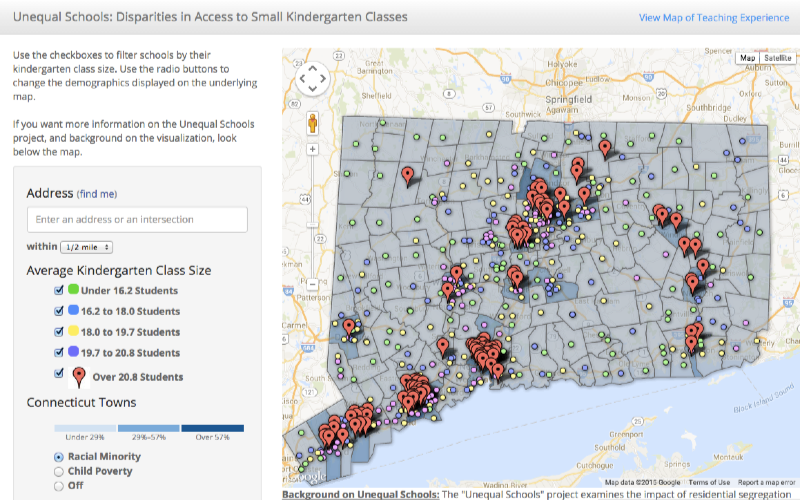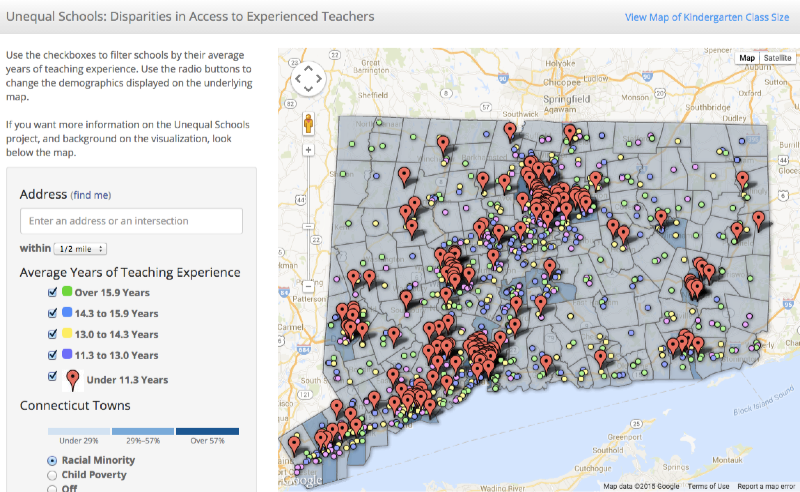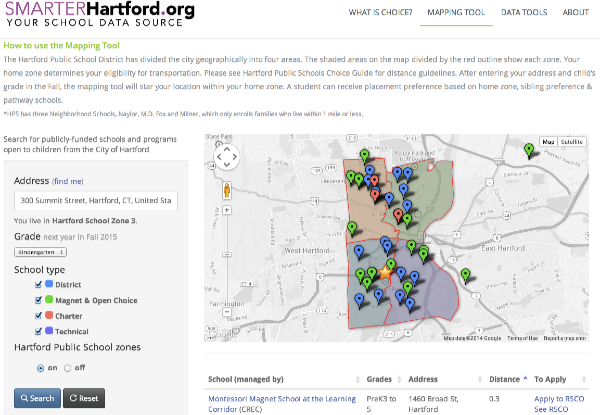Describe chart
Author: Jack Dougherty
Join our DataViz Community Partnerships for Spring 2016
Our weekly seminar will meet on Fridays from 12-1pm (light lunch provided) from January 29th to April 29th, 2016.
• Community partner sign-up: Describe your data visualization needs and request to be matched with a Trinity student intern, who you will supervise to work on your project for eight hours/week in Feb-March-April. Partners are welcome to all seminars, but must attend the Jan 29th lunchtime session and co-present the final products with the student at a late April event (choose among dates TBA).
• Trinity student sign-up: Describe your interests and request to be matched with a community partner for an eight hour/week internship. If approved, students must complete the internship application form and enroll in the weekly seminar (Formal Organizations 210, section 04), to earn 1.0 total credits. At least 5 students must enroll for this seminar to be offered. For questions, email jack.dougherty@trincoll.edu or book an appointment.
• Matchmaking between Trinity Students and Community Partners
Student Engagement with Open Data, Ferguson Library Public Forum, Stamford, Connecticut, July 8, 2015
My presentation will illustrate what students, faculty, and community partners can do with open data. Of course, open data is not a brand-new concept. For years, we have used federal census, state agency, and local government records to answer research questions. But open data makes our work easier and more accessible, for several reasons:
1) Open data is findable and exportable in many formats, such as the CT Education Directory, which enabled my students to create this basic school map, and to overlay school and town-level map data with a non-profit organization.
2) Open data providers can aggregate (or group) records in multiple ways, while protecting individual confidentiality, such as this data request, which led to our map of Hartford students by neighborhood residence.
3) Open data allows us to more easily build useful tools for the public, such as the Mobility App created by students with the Open Communities Alliance.
4) With open data, we also can build tools from live data feeds, such as this CTfastrak bus location site (beta version; learn how it works).
Remember: Technology is the easy part of open data. Rethinking our organizational roles and responsibilities requires hard work.
Unequal Schools searchable maps by CT Voices
Connecticut Voices for Children, a non-profit research and advocacy organization, published a new report, Unequal Schools: Connecticut’s Racial, Socioeconomic, and Geographic Disparities in Kindergarten Class Size and Teaching Experience. Their study reveals how low-income students and students of color are more likely to attend public schools with large kindergarten class sizes, and employ the least experienced teachers in Connecticut. These unequal educational resources are linked to the state’s long-standing patterns of residentially segregated housing.
When CT Voices co-authors Kenneth Feder and Sarah Iverson visited Trinity College to discuss their draft report, they asked for advice on how to communicate their findings with the public. Trinity College student Veronica Armendariz ’16, an Educational Studies major and student researcher in the Data Visualization project, recommended placing school inequality and town racial data in a searchable map, so that viewers can see statewide patterns and also zoom into specific neighborhoods. Veronica worked with CT Voices and taught them how to create their own searchable maps with Google Fusion Tables, using an open-source template developed by Derek Eder in Chicago. Click on both of the maps to explore the data.


Designing a school search tool with Achieve Hartford
In summer 2014 we collaborated with Achieve Hartford to design a school search tool that shows city parents their eligible public school choices. Our goal is to replace the existing SmartChoices site, which Trinity created in 2008, with a simpler tool that’s easier for a small non-profit organization to maintain on their own. To accomplish this task, we turned to Google Fusion Tables and the Searchable Map Template created by Derek Eder at DataMade in Chicago. Derek worked with us to expand his open-source code (available on GitHub) to display a sortable table of results in addition to the interactive map. It’s a responsive design, meaning that it adjusts the display to fit the size of your device, such as tablets and smartphones. Learn more about the background of this project and explore the beta version of SmarterHartford.org (which will be publicly launched soon).
